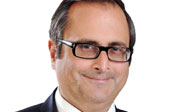 The biggest asset manager in Saudi Arabia could benefit if the country opens up its capital markets. But chief investment officer Faysal Badran says he has ways to target international investors if it does not. George Mitton reports.
The biggest asset manager in Saudi Arabia could benefit if the country opens up its capital markets. But chief investment officer Faysal Badran says he has ways to target international investors if it does not. George Mitton reports.
Saudi Arabia is the largest economy in the Gulf and would account for some 5% of the MSCI Emerging Markets Index, were it to meet the index provider’s requirements for entry by opening its stock market to direct foreign investment. But when might this happen?
“This has been a recurring discussion almost every year,” says Faysal Badran, chief investment officer of Saudi-based NCB Capital, with a trace of weariness in his voice.
He insists he does not know when the much heralded process will begin, though his company, the asset and wealth management division of Saudi Arabia’s National Commercial
Bank, is ready should the barriers come down. As the largest asset manager in Saudi, with about a third of the industry’s assets under management, the company would be likely to gain should the market expand.
‘HOT MONEY’ FLOWS
However, NCB Capital has made preparations in case the barriers stay up. At the end of 2012, the company launched two Ireland-domiciled, sharia-compliant Ucits funds – a Saudi equity fund and a Gulf Cooperation Council (GCC) equity fund. The products are aimed at institutional investors, principally in Europe and Asia, which cannot invest directly in Saudi stocks. Because they bear the Ucits brand, the vehicles should comply with big investors’ risk and governance requirements. They are marketed in alliance with Amundi Asset Management, from France.
The Ucits funds could attract fund flows even if Saudi’s stock market stays closed. This is prudent, says Badran, because any opening up would be a gradual process.
“I err on the side of openness, generally,” he says. “Markets and systems that are open tend to behave better in the long term. But it does carry caveats.”
The pace of change and the repercussions of “hot money” flows are two factors that will be carefully considered by the Saudi Capital Markets Association, he adds.
“The impact [of lowering the barriers] would be positive but the set-up for that to happen is a complex one that involves politics, policy and many aspects. Our regulator and our policymakers have been wise in being gradual about this.”
PERSONALISED SERVICE
There are other changes underway in the Saudi market, though. One of the biggest growth areas for NCB Capital in recent years has been discretionary portfolio management, which Badran says now accounts for a third of the company’s assets under management, while mutual funds account for the rest. Clients seem to like the bespoke option that a discretionary portfolio provides and, for very wealthy investors such as family offices, asset managers are happy to provide a personalised service.
NCB Capital has stated an ambition to be the leading wealth management house in the region and has established a “big apparatus” to help make this happen. For instance, hiring and training wealth managers, says Badran.
There are other changes planned at NCB Capital. The business is involved in discussions over outsourcing custody arrangements. State Street is “very close” to reaching a deal with NCB Capital, according to a source with knowledge of the situation. Badran says he cannot confirm this, however.
“We’re certainly talking to the big players, but I’m not at liberty to disclose at this point.”
NCB Capital is not only looking abroad for growth. Although Saudi Arabia has the biggest funds market in the Mena region by some margin – followed by Morocco and Kuwait, according to data provider Zawya – total Saudi assets under management are small compared with Saudi GDP of about $600 billion.
There was about $23 billion in Saudi-domiciled funds at the end of 2012, according to the Saudi Arabian Monetary Agency. The majority of the assets, 62%, were in money market funds, with equity funds accounting for about a third. Badran hopes equity investment will rise among the country’s domestic population, leading to increased fund flows.
“We’re sizeable in a big market, but the equity culture in Saudi is not mature. It’s still developing. In terms of classifications, we’re still a frontier market looking to graduate to an emerging market,” he says.
“The local savings pool is not yet fully an equity type like you would have in the UK or Europe. There’s plenty of space to grow domestically.”
POPULARITY
The popularity of money market funds relative to equity products may reflect risk aversion in Saudi Arabia. Like most Western exchanges, the Saudi stock index lost about half its value between 2008 and 2009. But unlike markets such as the US, it has still not recovered its peak and is currently trading at about 25% less than its level in mid-2008.
That said, the growth of money market funds is also a reflection of the huge amount of liquidity available in a country that exports nine million barrels of oil a day.
“There’s been a big amount of money flowing in, primarily because of the trickle effect of domestic growth and the amount of liquidity in the system,” says Badran.
It was this rising wealth that encouraged Badran to move back to his native Saudi Arabia seven years ago, having worked in banking in the US and Europe. He lives in Jeddah, the city on the east coast of Saudi where NCB Capital is based.
©2013 funds global MENA
